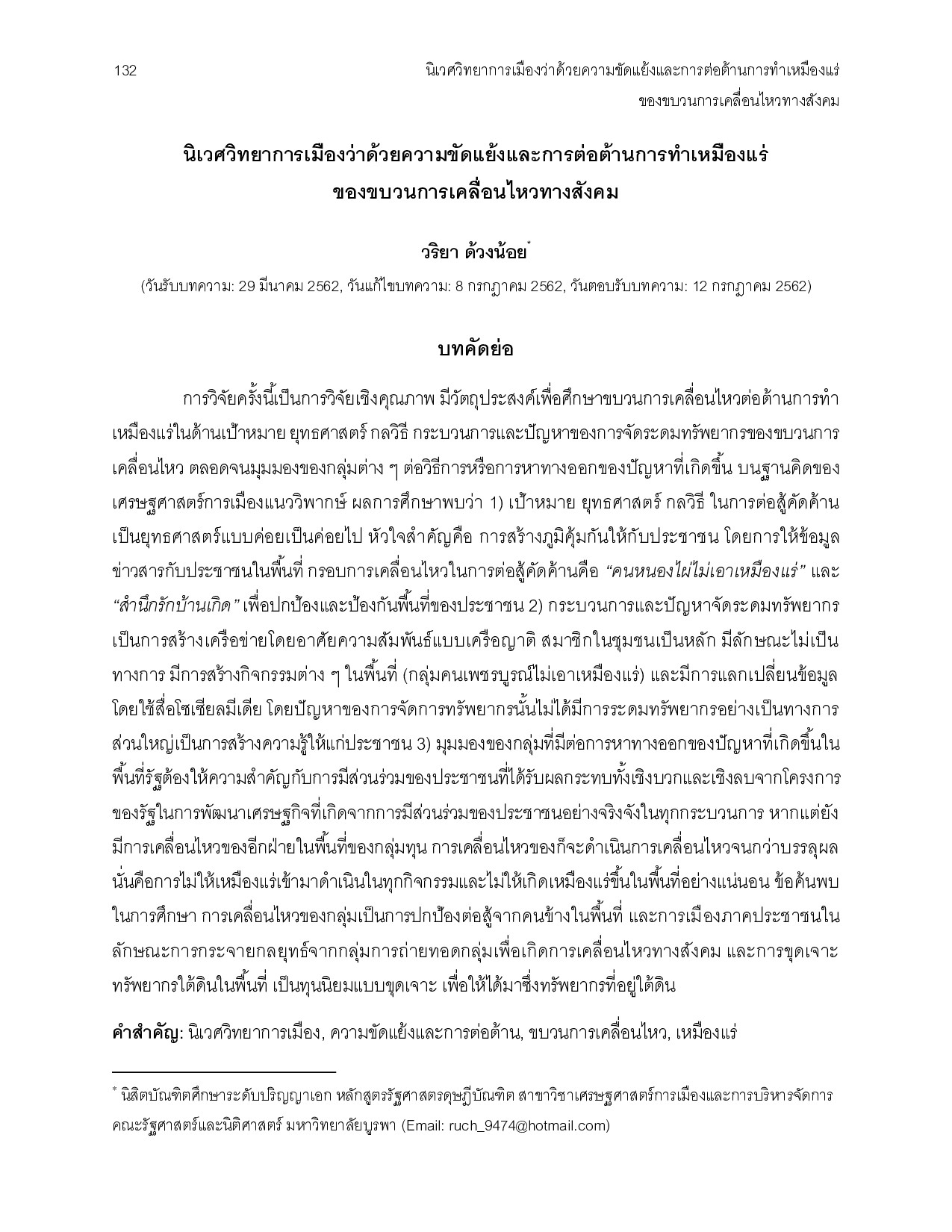Political Ecology of Conflict and Resistance to Mining of Social Movements
Keywords:
Political Ecology, Conflict and Resistance, Social Movement, MiningAbstract
The research methodology adopted for the thesis in qualitative with the main objective to study the goals, strategies, processes and problems resources of mobilization process. And a perspective of social movement on a solution to the problems. Under concept of critical political economy Research finding indicate that dominant of the goals, strategies, tactics of fighting, opposition is a gradual strategy. 1) The key build immunity for the people, by providing information to people in the area. The frame of movement in the fight against is “People in Nong Phai distric do not take the mining” and “Homeland Realization” to protect and protect public area. 2) Processes and problems, mobilize resources to create a network based on kinship relationships Main member of the Community Unofficial here are various activities in the area (Phetchabun people do not take mining) and exchange of information using social media. The problem of resource management does not have to mobilize official resource to learning and creates awareness for the people. 3) Group view towards finding solution to the problem in the area, the state must pay attention to the participation of people who have to be affected both positively and negatively from government programs in economic development caused by serious and serious and sincere public participation in all process. If there is still movement will continue in motion until achieving that is, not allowing the mines to carry out all activities and happen in the mining area. Topic of finding indicate that social movement of to protect the fight from the mining area. And the politics of the people in the political distribution strategy from the group to the group for social movement. And drilling of underground space resources in a drilling capitalism in order to acquire resources that are underground.
References
เอกสารภาษาไทย
กาญจนา แก้วเทพ และสมสุข หินวิมาน. (2553). สายธารนักคิดทฤษฎีเศรษฐศาสตร์การเมืองกับการสื่อสารศึกษา. กรุงเทพฯ: ภาพพิมพ์.
จักรพันธ์ สุทธิรัตน์. (2558). เหมืองสีเขียวเพื่อการพัฒนาอย่างยั่งยืน. ศูนย์เครือข่ายการจัดการสารและของเสียอันตราย. กรุงเทพฯ: เอสทีซี มีเดีย แอนด์ มาร์เก็ตติ้ง จำกัด.
ชัยยนต์ ประดิษฐศิสป์. (2555). วิธีวิทยาการวิจัยทางสังคม. จันทบุรี: โครงการผลิตตำราและเอกสาร ประกอบการสอน สาขาวิชารัฐประศาสนศาสตร์ มหาวิทยาลัยราชภัฏรำไพพรรณี.
ไชยณรงค์ เศรษฐเชื้อ. (2543). นิเวศวิทยาการเมืองการสร้างเขื่อนขนาดใหญ่ในประเทศไทย: โครงการเขื่อนแก่งเสือเต้น. วิทยานิพนธ์ศิลปศาสตรมหาบัณฑิต, สาขาวิชาการจัดการมนุษย์และสิ่งแวดล้อม, มหาวิทยาลัยเชียงใหม่.
ธเนศ มรรคาสกุล. (2557). ขบวนการเคลื่อนไหวทางสังคมรูปแบบใหม่ในประเทศไทย. การศึกษาค้นคว้าอิสระ หลักสูตรปริญญาศิลปศาสตรมหาบัณฑิต, สาขาวิชาสื่อศิลปะและการออกแบบ, มหาวิทยาลัยเชียงใหม่.
ประภาส ปิ่นตบแต่ง. (2552). กรอบการวิเคราะห์การเมืองแบบทฤษฎีขบวนการทางสังคม. เชียงใหม่: มูลนิธิไฮน์ริค เบิลล์ สำนักงานภูมิภาคเอเชียตะวันออกเฉียงใต้.
ปรีชา เปี่ยมพงศ์สานต์. (2543). จาก “นิเวศเศรษฐศาสตร์” สู่ “นิเวศวิทยาการเมือง” (พิมพ์ครั้งที่ 2). กรุงเทพฯ: คณะเศรษฐศาสตร์ จุฬาลงกรณ์มหาวิทยาลัย.
_______. (2557). เศรษฐศาสตร์การเมืองและทฤษฎีสังคมวิพากษ์. ตำราหลักสูตรปรัชญาบัณฑิต, สาขาวิชารัฐประศาสนศาสตร์, คณะมนุษยศาสตร์และสังคมศาสตร์, มหาวิทยาลัยขอนแก่น.
ศิริวัฒนา กังวาลเลิศ. (2543). เงื่อนไขที่นำไปสู่การรวมกลุ่มในขบวนการเคลื่อนไหวทางสังคมทางสิ่งแวดล้อมในระดับรากหญ้า ศึกษากรณี การต่อต้านการประกาศเขตอุทยานแห่งชาติแจ้ซ้อน. บัณฑิตวิทยาลัย, มหาวิทยาลัยเชียงใหม่.
เอกสารภาษาอังกฤษ
Boetie. E. l. & Bonnefon, P. (2007). The Politics of Obedience and Étienne de La Boétie. Montreal: Black Rose Books.
Chong, D. & Druckman, J. N. (2007). “Framing Theory.” Annual Review of Political Science, 10: 103-126.
Coser, L. A. (1956). The Function of Social Conflict. New York: The Free Press.
Karl, M. (1967). Capital: A critique of political economy. New York: International Publishers.
Snow, A. D. & Rochford, E. B. & Worden, J. & Benford, D. R. (1988). “Frame alignment processes, Micro-Mobilization, and Movement Participation.” American Sociological Review, 51(4): 464-481.
Snow, D. A. (2004). “Social Movement as Challenges to Authority: Resistances to an Emerging Conceptual hegemony.” In Myers, D. & Cress, D. (Eds.). Authority in Contention (Research in Social Movements, Conflicts and Change, Vol. 25) (pp. 3-25). Bingley: Emerald Group Publishing Limited.
Snow, D. A., & Benford, R. D. (2000). “Framing Processes and Social Movements: An Overview and Assessment.” Annual Review of Sociology, 26: 611-639.
Tilly, C. (2004). Social Movements 1768-2004. Boulder, CO: Paradigm Publishers.






